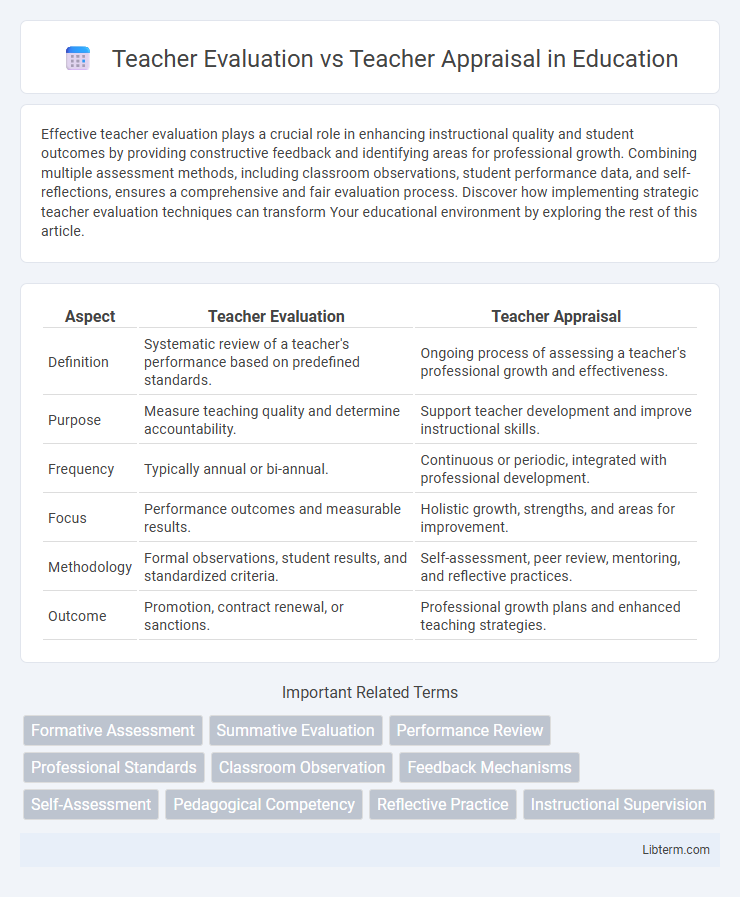Effective teacher evaluation plays a crucial role in enhancing instructional quality and student outcomes by providing constructive feedback and identifying areas for professional growth. Combining multiple assessment methods, including classroom observations, student performance data, and self-reflections, ensures a comprehensive and fair evaluation process. Discover how implementing strategic teacher evaluation techniques can transform Your educational environment by exploring the rest of this article.
Table of Comparison
| Aspect | Teacher Evaluation | Teacher Appraisal |
|---|---|---|
| Definition | Systematic review of a teacher's performance based on predefined standards. | Ongoing process of assessing a teacher's professional growth and effectiveness. |
| Purpose | Measure teaching quality and determine accountability. | Support teacher development and improve instructional skills. |
| Frequency | Typically annual or bi-annual. | Continuous or periodic, integrated with professional development. |
| Focus | Performance outcomes and measurable results. | Holistic growth, strengths, and areas for improvement. |
| Methodology | Formal observations, student results, and standardized criteria. | Self-assessment, peer review, mentoring, and reflective practices. |
| Outcome | Promotion, contract renewal, or sanctions. | Professional growth plans and enhanced teaching strategies. |
Introduction to Teacher Evaluation and Appraisal
Teacher evaluation and teacher appraisal serve as essential processes within educational frameworks aimed at assessing instructional effectiveness and professional growth. Teacher evaluation primarily focuses on systematically measuring teaching performance through observation, student outcomes, and feedback to ensure accountability and improve educational quality. In contrast, teacher appraisal emphasizes ongoing professional development by identifying strengths and areas for improvement, fostering reflective practice, and supporting career advancement.
Defining Teacher Evaluation
Teacher evaluation refers to a systematic process that measures a teacher's performance, effectiveness, and impact on student learning through various tools such as observations, student assessments, and feedback. It aims to provide objective data to support professional growth, inform administrative decisions, and ensure teaching quality aligns with educational standards. Unlike broader teacher appraisal, teacher evaluation focuses specifically on measurable criteria linked to instructional practices and student outcomes.
Understanding Teacher Appraisal
Teacher appraisal is a comprehensive process aimed at assessing educators' performance through structured observations, student feedback, and professional development goals, focusing on growth rather than mere judgment. Unlike teacher evaluation, which often emphasizes accountability and ranking, appraisal supports continuous improvement by identifying strengths and areas for development. Effective teacher appraisal systems incorporate clear criteria, regular feedback, and collaborative goal-setting to enhance instructional quality and student outcomes.
Key Differences Between Evaluation and Appraisal
Teacher evaluation primarily measures instructional effectiveness using standardized criteria, such as classroom observations and student performance data. Teacher appraisal emphasizes professional development by identifying strengths and areas for growth through self-assessment and peer reviews. Evaluation tends to be summative and performance-driven, whereas appraisal is formative and growth-oriented.
Objectives of Teacher Evaluation
Teacher evaluation aims to systematically assess educators' performance using criteria such as teaching effectiveness, student engagement, and professional development progress. The primary objectives include identifying strengths and weaknesses, informing instructional improvements, and ensuring accountability within educational institutions. Effective teacher evaluation promotes continuous growth and supports informed decisions regarding career advancement and training needs.
Purposes of Teacher Appraisal
Teacher appraisal serves the primary purpose of professional development by identifying strengths and areas for growth, guiding targeted training and continuous improvement. It aims to foster a supportive environment that encourages reflective practice and enhances instructional effectiveness. Unlike teacher evaluation, which often focuses on performance judgment, appraisal emphasizes collaborative feedback and long-term career advancement.
Methods Used in Teacher Evaluation
Teacher evaluation primarily employs methods such as classroom observations, student performance data analysis, and structured self-assessments to measure instructional effectiveness. Standardized rubrics and peer reviews further enhance the objectivity of these evaluations by providing consistent criteria for assessing teaching practices. These methods collectively aim to identify strengths and areas for professional growth, ensuring instructional quality aligns with educational standards.
Approaches Adopted in Teacher Appraisal
Teacher appraisal primarily adopts formative and developmental approaches, emphasizing continuous feedback and professional growth through reflective practices, peer observations, and student performance analysis. This contrasts with teacher evaluation, which often uses summative methods focusing on standardized test scores and performance ratings for accountability purposes. Approaches in teacher appraisal include collaborative goal-setting, mentoring, and personalized professional development plans designed to enhance instructional effectiveness over time.
Impact on Teacher Development and Performance
Teacher evaluation primarily measures instructional effectiveness through standardized criteria, providing targeted feedback that directly influences teacher development and performance improvement. Teacher appraisal often involves a broader assessment including self-reflection and peer reviews, fostering professional growth by encouraging continuous learning and collaboration. Effective use of both evaluation and appraisal systems enhances teacher skill acquisition, motivation, and instructional quality, leading to improved student outcomes.
Best Practices for Effective Evaluation and Appraisal
Teacher evaluation and teacher appraisal both aim to enhance instructional quality but differ in scope and purpose, with evaluation often being a formal performance measurement and appraisal focusing on professional growth. Best practices for effective evaluation and appraisal include establishing clear, measurable criteria aligned with teaching standards, incorporating multiple data sources such as classroom observations, student feedback, and self-assessments, and fostering ongoing, collaborative dialogue between educators and evaluators. Continuous professional development opportunities tailored to identified strengths and areas for improvement support sustained teacher effectiveness and student achievement.
Teacher Evaluation Infographic

 libterm.com
libterm.com